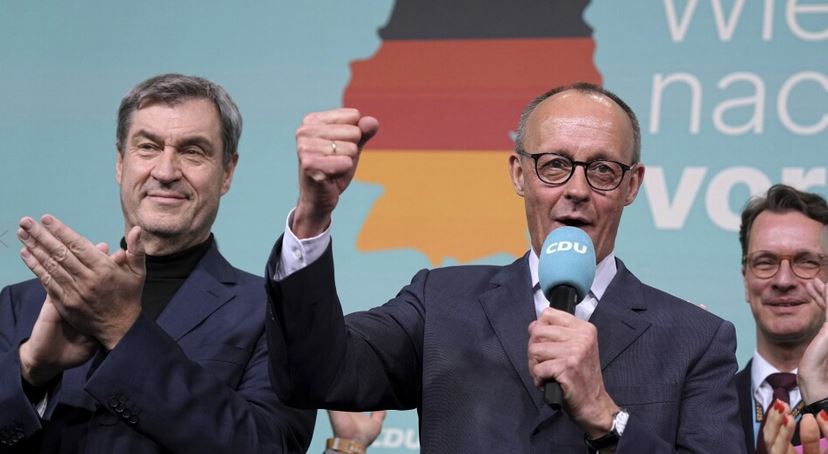
Bartosz M. Rydliński
WARSAW – Germany’s Social Democrats are one of the West’s oldest political parties, with a legacy of advocating parliamentary democracy, opposing Nazism, and leading the modernization of postwar Germany. In addition to the many notable labor, economic, and human-rights reforms that the party has implemented over the years, former SPD leader and West German Chancellor Willy Brandt’s Ostpolitik in the 1970s laid the groundwork for Germany’s reunification in 1990.
But today’s SPD is a shadow of its former self: the party won only 16.4% of the vote in Sunday’s federal election, putting it behind both the Christian Democratic Union/Christian Social Union (CDU/CSU) and the far-right Alternative für Deutschland (AfD). It is worth considering how this defeat came about, and what it means for the future of Western social-democratic forces.
Support for the SPD began to fall toward the end of the 2000s. In the 2005 and 2009 federal elections, the party received, respectively, 34.2% and 23% of the vote – a drastic decline from the 1998 federal election, when it won nearly 41% of the vote. This drop-off can be largely attributed to the Agenda 2010 and Hartz reforms that Chancellor Gerhard Schröder introduced in the early 2000s. Schröder’s neoliberal project, which sought to revive a stagnant German economy by deregulating the labor market and reducing welfare benefits, put the SPD at odds with its working-class base, organized in powerful trade unions. It also led the charismatic finance minister and former party leader Oskar Lafontaine to defect to a left-wing alliance, taking the SPD’s socialist faction with him.
Despite this exodus of voters, the SPD could rest on its laurels as the junior coalition partner to the CDU/CSU – its main competitor – under Germany’s “Iron Chancellor,” Angela Merkel. When Merkel retired in 2021, the SPD won that year’s election with one-quarter of German votes. But SPD leader and German Chancellor Olaf Scholz had to form a “traffic-light coalition” (so named for the parties’ colors), with the Greens and the liberal, market-oriented Free Democrats. This led his government to pursue conflicting goals: advancing social justice and lowering taxes; constructing social housing and boosting support for entrepreneurs; combating climate change and protecting Germany’s automotive industry. Such a wide-ranging agenda did little to win back the trust of workers, especially with fear of globalization on the rise.
In the lead-up to the recent election, neither Scholz nor his party seemed to gauge German voters’ primary concerns accurately. According to Infratest dimap’s ARD-DeutschlandTREND survey, 37% of Germans consider immigration to be the most important problem facing the country – an issue on which the SPD has been ambivalent and indecisive. The party tacitly supported Merkel’s “open-door policy” in 2015, when Germany accepted more than one million asylum-seekers from Syria, Afghanistan, and other countries in the Middle East and North Africa. And yet, Scholz has advocated deporting “serious criminals” to Syria and Afghanistan following terror attacks. Instead of winning over voters, this muddled approach to migration and security has bolstered the anti-immigration AfD’s claim that it was right all along about the “Muslim threat.”
The second most important issue for voters, according to the Infratest dimap survey, is the economy, with 34% of respondents agreeing that it should be the government’s top priority. As an article about Scholz in Der Spiegel recently pointed out, the German economy contracted for the second consecutive year in 2024, the number of unemployed people is rising, industry is cutting jobs, and consumer confidence has tanked. The fact that this occurred on Scholz’s watch undermined his image as a successful economic steward, burnished during Merkel’s term. This resulted in a devastating loss of working-class support for the SPD. According to Infratest dimap’s exit poll, the AfD won 38% of workers’ votes, compared to just 12% for the SPD.
Scholz fell short in other areas, too. The much-heralded turning point (Zeitenwende) in foreign policy and national security after Russia’s full-scale invasion of Ukraine in 2022 has not materialized. Germany barely met NATO’s 2% defense-spending target and has not honored its commitments to Ukraine. As Benjamin Tallis concluded in his report titled “The End of the Zeitenwende” for the German Council on Foreign Relations, Scholz’s project has been a failure.
The SPD’s electoral disaster is reminiscent of the Democrats’ defeat in the 2024 US presidential election. Both parties failed to formulate an effective response to migration concerns, win over working-class voters, and adopt major progressive economic reforms. Instead, they chose to emphasize cultural liberalism, which appealed to the winners of globalization – people who do not fear for their future.
But fear of being left behind economically and socially proved to be potent fuel for both Donald Trump and the AfD. So long as social democrats fail to address this fear, the far right will continue to exploit it. If center-left parties want to regain their relevance, they must confront and analyze their electoral failures and declining support while finding new ways to make inroads with workers and shield them from the effects of deindustrialization, automation, and artificial intelligence.
Bartosz M. Rydliński is an assistant professor of political science at Cardinal Stefan Wyszyński University in Warsaw.
Copyright: Project Syndicate, 2025.










